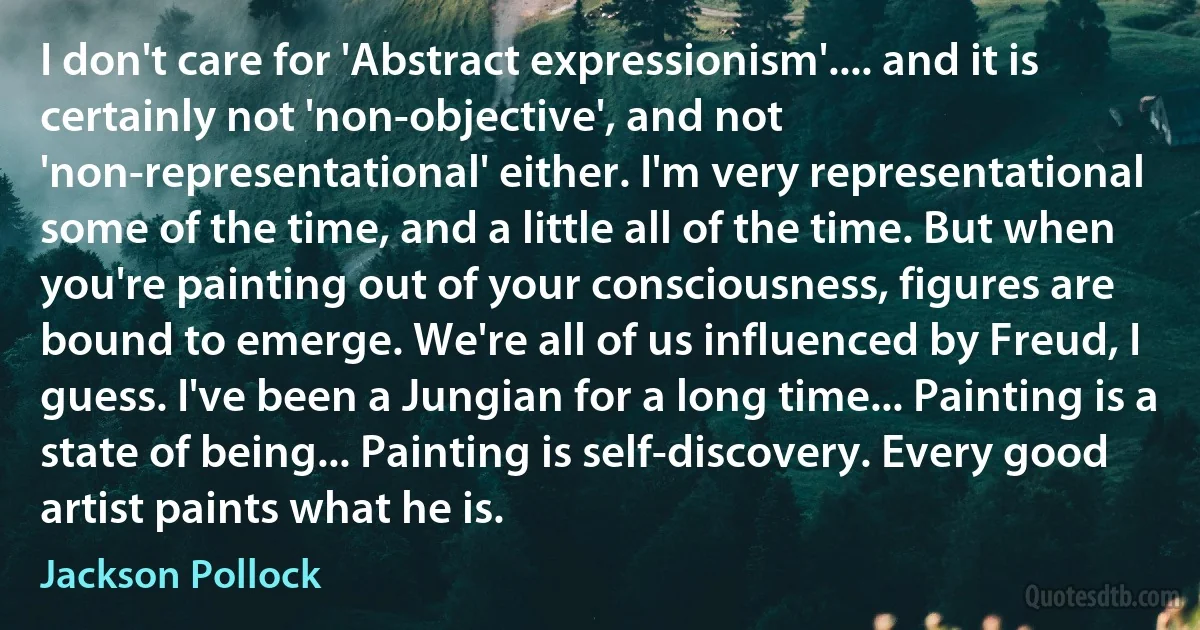Freud Quotes - page 3
Man is essentially a dreamer, wakened sometimes for a moment by some peculiarly obtrusive element in the outer world, but lapsing again quickly into the happy somnolence of imagination. Freud has shown how largely our dreams at night are the pictured fulfilment of our wishes; he has, with an equal measure of truth, said the same of day-dreams; and he might have included the day-dreams which we call beliefs.

Bertrand Russell
The progress of human knowledge depends on maintaining that touch of scepticism even about the most "unquestionable" truths. A century ago, Darwin's theory of evolution by natural selection was regarded as scientifically unshakeable; today, most biologists have their reservations about it. Fifty years ago, Freud's sexual theory of neurosis was accepted by most psychiatrists; today, it is widely recognized that his methods were highly questionable. At the turn of this century, a scientist who questioned Newton's theory of gravity would have been regarded as insane; twenty years later, it had been supplanted by Einstein's theory, although, significantly, few people actually understood it. It seems perfectly conceivable that our descendants of the twenty-second century will wonder how any of us could have been stupid enough to have been taken in by Darwin, Freud or Einstein.

Colin Wilson
We developed a shorthand language of our own which we fell into for the rest of our lives whenever we met, no holds barred - all a matter of past reference, a common language, but basically affection, along with humor, and appreciation of each other's minds, and of Krazy Kat . Faced with England, and the New World, and Freud and all, we always managed to relax, and go back to the kidding, and bad punning, and drinking, to the end. It really was marvelous.

Conrad Aiken
By the approach through abnormality we have succeeded in penetrating most deeply into the darkness of human nature ... The literary person should be the last person to be surprised at this fact. Sooner might he be surprised that he, considering his strong generally and individual tendency, should have so late become aware of the close sympathetic relations which connected his own existence with psychoanalytic research and the life-work of Sigmund Freud. I realized this connection only at a time when his achievement was no longer thought of as merely a therapeutic method, whether recognized or disputed; when it had long since outgrown his purely medical implications and become a world movement which penetrated into every field of science and every domain of the intellect: literature, the history of art, religion and prehistory; mythology, folklore, pedagogy, and what not.

Thomas Mann
The innovator, however, must in the first place be discontented, he must doubt the value of what he is doing or question the accepted ways of doing it. And secondly, he must be prepared to take fresh paths, to venture into fields where he is by no means expert. This is true, at least, of major forms of innovation; they make it possible for other men to be expert, but are not themselves forms of expertise. Freud was not an expert psycho-analyst; before Freud wrote there was no such thing; he created the standards by which psycho-analysts are judged expert. Neither was Marx an expert in interpreting history in economic terms nor Darwin an expert in evolutionary biology. If a man is trained, purely and simply, to be expert and contented in a particular task he will not innovate; Freud would have remained an anatomist, Marx a philosopher, Darwin a field-naturalist.

John Passmore
It is chiefly the psychologists of the school of Freud who have pointed out that many of man's thoughts and actions are compensatory substitutes for desires which he has been obliged to suppress. A thing may be desired not for its intrinsic worth or usefulness, but because he has unconsciously come to see in it a symbol of something else, the desire for which he is ashamed to admit to himself...This general principle, that men are very largely actuated by motives which they conceal from themselves, is as true of mass as of individual psychology...Human desires are the steam which makes the soial machine work. Only by understanding them can the propagandist control that cast, loose-jointed mechanism which is modern society.

Edward Bernays
There is a rhetoric of knowledge, a characteristic way in which arguments, proofs, speculations, experiments, polemics, even humor are expressed. ...speaking or writing a subject is a performing art, and each subject requires a somewhat different kind of performance from every other. Historians, for example, do not speak or write history in the same way biologists speak or write biology. ...it is worth remembering that some scholars-one thinks of Veblen in sociology, Freud in psychology, Galbraith in economics - have exerted influence as much through their manner as their matter. The point is that knowledge is a form of literature, and the various styles of knowledge ought to be studied and discussed.

Neil Postman
Freud taught us that it wasn't God that imposed judgment on us and made us feel guilty when we stepped out of line. Instead, it was the superego - that idealized concept of what a good person is supposed to be and do - given to us by our parents, that condemned us for what had been hitherto regarded as ungodly behavior.

Tony Campolo
Do I, who've read Freud, know what the Future of an Illusion really is and know that religious belief is ineradicable as long as we remain a stupid, poorly-evolved mammalian species, think that some Canadian law is gonna solve this problem? Please. No, our problem is this: our pre-frontal lobes are too small, and our adrenalin glands are too big, and our thumb-finger opposition isn't all that it might be, and we're afraid of the dark, and we're afraid to die, and we believe in the truths of holy books that are so stupid and so fabricated that a child can - and all children do, as you can tell by their questions - actually see through them. And I think it should be (religion) treated with ridicule and hatred and contempt. And I claim that right.

Christopher Hitchens
I must also call your attention to the fact that it is crucial for my viewpoint that human behavior is to a large extent charged with a considerable amount of energy, but that in contrast to Freud I do not consider this energy to be sexual, but the vital energy within any organism which, according to biological laws, gives man the desire to live, and that means to adapt himself to the social necessities of his society. To go back to what I consider to be the misunderstanding, it has never been my position that society only deforms or manifests that which is already there. If we make the distinction between human necessities in general and human desires in particular then indeed, society creates particular desires which, however, follow the general laws of the necessities rooted in human nature.

Erich Fromm
The gist of my argument is that men like Kraepelin, Bleuler and Freud were not what they claimed or seem to be-namely, physicians or medical investigators; they were, in fact, religious-political leaders and conquerors. Instead of discovering new diseases, they extended, through psychiatry, the imagery, vocabulary, jurisdiction, and hence the territory of medicine to what they were not, and are not, diseases in the original Virchowian sense.

Thomas Szasz



